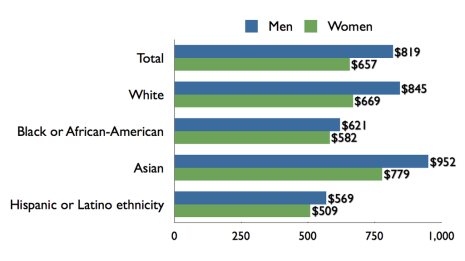Maria Maisto is President/Executive Director of the New Faculty Majority Foundation. I first learned about her work in 2010, doing search after search trying to find out if there were any organizations addressing the adjunct crises. I came across NFM, joined the org and joined the e-mail list. I mostly quietly observed the communications, trying to get a sense of who this group f activists were and what labor activism is versus community-based activism. I learned a lot.
Maria has been going up against the system creating, as she calls it, “the largely manufactured adjunct crises,” very directly. You can find her testifying before the IRS trying to insure we didn’t lose as much income as was clearly coming down the pike when administrators were finding ways to avoid including contingent faculty under the new ACA/Obamacare guidelines.
Early on in SEIU’s organizing they turned to Maria to understand more about adjunct working conditions.
She worked with Rep. George Miller, the senior committee Democrat, from California, on the first major survey of adjunct faculty working conditions, and the first time these were paid attention to in congress.
And, really cool in my mind, she was on the Melissa Harris Perry show.
I’m honored to be at a place in my organizing where I can reach out to Maria and she sends back the beautiful piece below.
***
Like Joe and Helena, I have had the opportunity to tell the story of my path to activism several times. I have mixed emotions about it, because each time, sometimes by choice and sometimes not, a different dimension of that journey has been illuminated in ways  that I worry might oversimplify or distort the larger context. There is always more to any story than any one narrative can relate. In this telling, though, Jessica has issued a welcome invitation to explore some of the complexity, so I’m going to try.
that I worry might oversimplify or distort the larger context. There is always more to any story than any one narrative can relate. In this telling, though, Jessica has issued a welcome invitation to explore some of the complexity, so I’m going to try.
As it did for Joe, the adjunct movement saved my life, perhaps even literally. I became an activist not just in response to my incredulity and outrage at the unfairness and unprofessionalism of the way in which adjunct faculty and their students were treated, but also in response to the experience of having two family members receiving life-altering medical diagnoses, at the same time that I was pregnant with my third child, having my spouse lose his job at the height of the recession, and working as an adjunct as almost our only source of support. Plunging into adjunct activism was, for me, a way of channeling potentially self-destructive fear and anxiety about my family’s survival into a more healthy and empowering endeavor.
What my family was up against was immense: prejudice against, and profound ignorance about, incredibly important issues ranging from gender equality to mental health and neurodiversity, by institutions that I had been raised to respect and support: the Catholic Church and the public school system. These were not easy battles (and they continue today); I knew that I was up against good people acting out of fear and ignorance as much as I was fighting (especially in the case of the Church) deeply rooted, long-lived, corporate-level cynicism, prejudice, and bullying. We were not just dealing with willful ignorance but with medical, educational, legal, and yes, theological missteps, no less devastating for being so unintended. It was daunting, and it was exhausting.
By contrast, it seemed to me, the adjunct problem was straightforward. It was easy, and therapeutic, to work on the adjunct crisis because there are so few authentic complexities to it, only largely manufactured ones: artificial job scarcity, a manipulation of supply and demand, conscious decisions to automate and scale what should not be automated and cannot be scaled, old-fashioned elitism laced with sexism and racism, and finally, a deliberate undermining of the responsibilities of faculty and the rights of students. In response, the course of action is clear: Organize. Demand compensation that reflects the value of the work of education and respects the people who engage in it. Insist on ethical hiring and evaluation practices. Commit to clearly articulated principles and values, like academic freedom, shared governance, due process. Work the inside and the outside, finding policy solutions when possible.
If the strategies for resolving the crisis are clear, their execution is, of course, more complicated. There is well-documented diversity of experience, motivation, and ambition among adjunct faculty and among adjunct faculty activists. We don’t have clear enough consensus about strategy, about goals, or about where to create coalitions and cultivate allies. One way that NFM has tried to address this challenge is by understanding and articulating its foundational principle, that faculty working conditions are student learning conditions, both pragmatically and philosophically. That is, we can point (without impugning the professionalism or personal worth of individual adjunct faculty members) to the harm that is done to students by the contingent employment system. We don’t just explain that unequal levels of support for faculty necessarily result in unequal learning experiences for students in terms of potential “learning outcomes.” In fact, the harm that is done is more insidious, as the practice of a multi-tiered contingent employment system is a lesson by example, normalizing exploitation and encouraging its reproduction.
Another complication, one that has been far more challenging in my experience, has to do with the gravity of the adjunct crisis relative to other problems and challenges to which we are witness in the world today. As I continue to advocate on behalf of mental health, neurodiversity, and gender equality in other aspects of my personal and professional life, I become more aware of the overlap with my adjunct activism, but I also become more aware of how insignificant the adjunct crisis can seem by comparison. Every adjunct activist, no matter how exploited, is given the opportunity to check our privilege when we begin to learn about and work with other contingent and precarious workers or in other movements.
Adjunct activists are rightfully cautious about highlighting any positive characteristics to the adjunct life, because unscrupulous administrators and others have exploited our commitment to teaching by obscuring the important difference between vocation and job satisfaction. Yet quite apart from the well-documented intellectual and emotional rewards of teaching, one invaluable benefit of the adjunct experience, for me, has been the way it can sensitize, or in a Freirean sense, conscientize, us as members of the higher education community to the structural inequities and injustices that pervade it, and by extension, the world writ large. Adjuncts, especially those whose racial, gender, cultural, or class backgrounds were insulation from the indignities and aggressions that are everyday experience for members of targeted communities can, through the experience of being adjuncts, get a tiny inkling of what that experience can be like, for many of our students and for too many of our fellow human beings in the world. Because we are educators, this experience is invaluable for helping us remember that our struggle is not and should not be for ourselves alone.
commitment to teaching by obscuring the important difference between vocation and job satisfaction. Yet quite apart from the well-documented intellectual and emotional rewards of teaching, one invaluable benefit of the adjunct experience, for me, has been the way it can sensitize, or in a Freirean sense, conscientize, us as members of the higher education community to the structural inequities and injustices that pervade it, and by extension, the world writ large. Adjuncts, especially those whose racial, gender, cultural, or class backgrounds were insulation from the indignities and aggressions that are everyday experience for members of targeted communities can, through the experience of being adjuncts, get a tiny inkling of what that experience can be like, for many of our students and for too many of our fellow human beings in the world. Because we are educators, this experience is invaluable for helping us remember that our struggle is not and should not be for ourselves alone.
At the same time, we are constantly in danger of making our fight too precious and of forgetting its place in the larger scheme of things. The empathy that we learn as a result of being an adjunct can be corrupted into self-indulgence. Our movement is not advanced — in fact it is undermined — when a white activist equates the adjunct crisis to slavery or apartheid; when a male activist claims that a slight he experienced is equivalent to that of a sexually assaulted woman; when a white woman activist fails to understand or acknowledge the layers of additional pressure and prejudice experienced by colleagues of color; when a young or healthy activist dismisses or ignores the particularly terrifying precarity that older or disabled colleagues experience in a world already hostile to them.
So while I find myself no less committed to the cause now than when I started, I now believe that our movement, now decades old, needs to challenge itself more rigorously. So I agree with Joe that our movement has to take better care of each other personally. I believe that one of the ways to do that is by introspectively exercising the very skills and training that gave us entry into the profession and the movement to begin with: our critical and analytical faculties. There are far greater evils in the world than the adjunct crisis, but there are few other movements as equipped, or as required, to engage in critical self-reflection as we practice our activism. In this way, the adjunct movement can encourage a different kind of learning — faculty learning — that can help transform working and living conditions for students, faculty, and communities even far beyond the confines of the classroom.
Maria can be contacted at maria.maisto@newfacultymajority.info maria.maisto@nfmfoundation.org Ph: (216) 262-4375 NFM Web: newfacultymajority.org NFMF Web: nfmfoundation.org

Reblogged this on PrecariLeaks.
LikeLike
Reblogged this on National Mobilization For Equity.
LikeLike